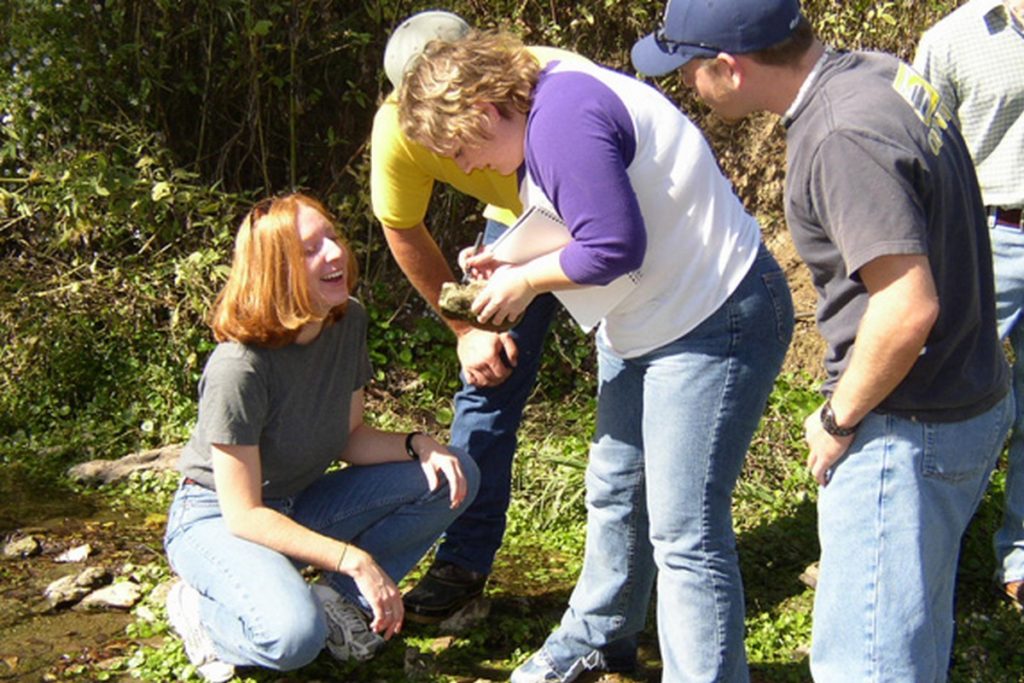B.S. in Geoscience
Overview
This degree emphasizes the study of the physical, chemical, and biological processes of the Earth, from its deep interior to the surface. Geoscience majors also study topics such as:
- Rivers/beaches
- Volcanoes
- Glaciers
- Earthquakes/plate tectonics
- Global Climate Change
- Soils/sediments
Each of these paths is tailored for helping the student reach their desired career goals, and our geoscience faculty advisers will assist the student in making the most of their degree. Each of these concentrations is described below:
- Geology: Majors concentrate on the standard geological sciences, and most graduate and go to work in the oil field. Some will go on the graduate work in sedimentology, stratigraphy, paleontology, environmental science and seismic work, to name a few. Those who get their master’s will often work for major oil companies, but could go on to teach and work other field oriented jobs, depending on their concentration.
- Environmental Science: This degree combines chemistry, geology, and biological sciences. Most people who graduate with this degree will either go on to graduate studies or directly into the field working remediation and environmental assessment jobs.
- Petroleum Geology: This degree is designed to aid those students going directly into petroleum work. Courses are much more intensive. Most majors will go on to do a master’s, then work in the petroleum field.
- Science Teacher Certification (Grades 8-12): a well-defined route leading to teacher certification in science. Upon graduation, students are prepared to teach grades 8-12 sciences courses in the State of Texas.
- Hydrogeology: Another highly intensive degree, this is intended for those who with to work on our water resources. Majors will go on to work in waterways and groundwater assessment.
- Earth Science: A very diverse route for those who want a rounded science experience or want to explore the different earth science fields. Many will go on to get alternative teacher certification from the state of Texas, or go on to study fields such as oceanography and meteorology.

Estimated Completion
120 credit hours (4 years)
Application Process
Cost
Locations Available
Department
College
Jump Right In
Using a wide variety of tools and techniques, students will learn how geoscientists investigate various environmental hazards, such as:
- Landslides/floods
- Hurricanes
- Water pollution
- Toxic chemical spills
- The availability of mineral/energy/water resources
- The history of Earth and its inhabitants
Designed With You in Mind
With small class sizes, students will have the benefit of individual attention and instruction from their professors. We offer a variety of field and laboratory classes, which enable students to gain hands-on learning experience. Our faculty members are involved in a wide range of research activities including areas such as:
- Mineral chemistry
- Paleontology
- Petroleum
- Non-point pollution
- Water supply protection
- Wetland hydrology
Accreditations
Related Programs
Not what you were looking for? Tarleton State University offers over 100 different degrees and certifications that may be of interest to you, including:
- B.S. Environmental Science
- B.S. Geographic Information Systems
- B.S. Biology
- M.S. Biology
- M.S. Environmental Science
Plan Your Future
Program Objectives
- Prepare students for a wide range of Geoscience associated careers.
- Prepare students for work in the Environmental Science field.
- Prepare students for work in the Petroleum Industry by teaching the math skills that are critical to success in both industry jobs and Graduate School.
- Use the Teacher Certification Program to mold the next generation of high school science teachers.
- Prepare students for employment in the Hydrogeology field by focusing on related sciences that pertain to the occurrence, movement, and quality of water with particular attention to groundwater and water-related environmental problems.
- Provide a field of study that gives an overview of the Earth Sciences that will enable students to gain the extensive knowledge needed to succeed in any related industry.
Coursework Highlights
| Class | Number | Class Name |
|---|---|---|
| EASC | 2310 | Earth Systems Science |
| EASC | 3350 | Environmental Science |
| GEOL | 1408 | Natural Disasters |
| GEOL | 3305 | Paleontology |
| GEOL | 3315 | Sedimentary Petrology |
| GEOL | 3400 | Crystallography and Mineralogy |
For more information on courses, please refer to the university catalog.





